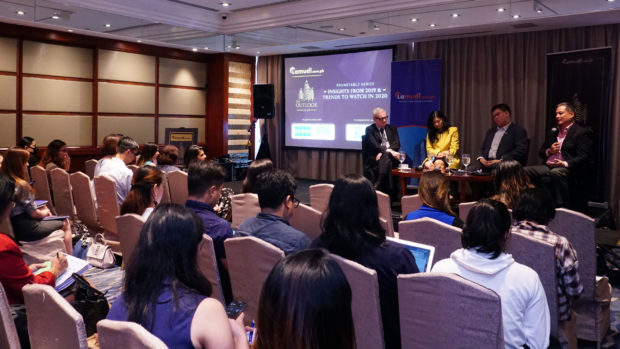PH realty sector remains hopeful amid threat

Photo shows (from left) Lamudi CEO Bhavna Suresh, IWG country manager Lars Wittig, Federal Land EVP Catherine Ko, Phinma CEO Raphael Felix and Colliers senior manager for research Joey Roi Bondoc.
Real estate firms and property market specialists are hoping that the industry will still remain resilient against the threats posed by the rising incidence of COVID-19 cases in the country.
COVID-19 refers to the disease caused by a new strain of coronavirus (SARS-CoV-2) that reportedly emerged from the wildlife market in Wuhan City, the capital of Hubei province in central China. Since reports of the outbreak came out in December 2019, the disease has since spread to 114 countries and territories, killing 4,300 people and affecting over 121,000 others as of this writing.
In a press briefing Wednesday, Pronove Tai president and chief executive officer Monique Pronove said the impact of COVID-19 on real estate will already be felt in the first half of 2020, with the segments being affected differently. For instance, the hospitality sector, including hotels, resorts and convention centers, will be adversely affected in the short to medium term. It is expected that occupancy levels will drastically decrease due to lower tourist arrivals as well as the temporary postponement of large MICE (meetings, incentives, conferences and exhibitions) events. Similarly, major retail, commercial and entertainment centers especially those tenanted by food and beverage, cinemas and non-essential luxury tenants, will be affected by COVID-19 as these areas are expected to experience lower foot traffic.
The office property market, however, is seen to be resilient. Pronove disclosed that 54 percent of the office stock is occupied by traditional companies who have started—or expected to start—business continuity plans. Thirty three percent of the office stock is occupied by BPOs, knowledge process outsourcing and IT, while 11 percent of the office market is tenanted by flexible workspaces.
Best practices
Lower foot traffic, however, is expected within these buildings as some companies are expected to increasingly work in shifts. Some corporations are already implementing this scheme even before the outbreak of COVID-19. To help cushion the impact of this disease, Pronove has urged those in the office sector to learn from Singapore’s best practices when it comes to dealing with COVID-19.
Article continues after this advertisement“I think we have the benefit of hindsight. We are able to look at the best practices both in Hong Kong and Singapore. (Singapore) has reported that things are already going back to normal. The practice of business continuity planning and work shifting has actually happened,” Pronove explained. “The landlords have become more negotiable in their rents. What we have seen is the opportunity of some corporates to actually move back to the CBD because of the negotiable rates.”
Article continues after this advertisementPronove further emphasized on the need to make regular disinfection and sanitation of office and commercial spaces as the new norm, in the same way that fumigations and pest controls are done regularly. There is likewise a need to educate the building administrators, the security as well the human resources officers.
Minimal impact meanwhile is seen for the residential market and industrial warehousing, while the health and wellness sector, hospitals and supermarkets and convenience stores are seen to be positively affected by the current health crisis.
Positive outlook
Other industry players meanwhile kept a positive outlook amid the outbreak of this new disease.
“We are not feeling the effect yet,” said Catherine Ko, executive vice president of Federal Land Inc. and president of Sunshine Fort North Bonifacio Realty Development Corp. “So far, things have been stable for us, things have been very good. We anticipate that in the chaos or panic that people are going through right now, there will be little resistance.”
Speaking at Lamudi’s The Outlook 2020: Roundtable Series, Ko disclosed that Federal Land, however, may have to hold off on some of its open houses.
“Maybe there will be a move to postpone buying but not to cancel outright. I think people are still positive that we will get through this crisis—it’s just a matter of time,” she added.
Raphael Felix, chief executive officer of Phinma Property Holdings Corp. and chairman of the Subdivision and Housing Developers Association (SHDA), has similarly remained unfazed.
“Home buying is something you plan for. It’s not like going out to a restaurant or buying a new shirt. It’s something you plan for well in advance. People have this in their mindsets, they have it as an objective, they’re out to do it,” Felix explained.
He also pointed out the pent up demand in the residential market.
“We can’t supply it (the demand) fast enough. Despite what people think of the real estate industry producing so many units, on the contrary, it is not. Over the last two years, production has been dropping so it has made things more scarce,” Felix said. “Plus there’s a concentration of this virus scare in Metro Manila. There are so many other places out there. The regions are booming. In fact, there is more growth in the regions now. I don’t see it (real estate sector) slowing unless this (COVID-19) escalates rapidly.”
In the same briefing, Colliers International Philippines senior manager for research Joey Roi Bondoc shared that prior to the outbreak of COVID-19, the real estate agency has been seeing a robust property market. The office market, for instance, was doing well with business process outsourcing firms still looking for space in Metro
Manila and government agencies, for newer office buildings. All these projections, however, have somehow changed after the COVID-19 issue.
For his part, Lars Wittig, country manager of International Workplace Group (IWG), said business continuity can still be ensured should companies opt for a work-from-home arrangement, which would allow employees to do their jobs in the safety of their homes. Witting said they have a network of flexible workspace close to people’s homes—not just in the central business districts of Metro Manila but also in the suburbs and tier 2 cities, from Pampanga all the way to Cebu and Davao.
